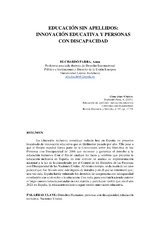Mostrar el registro sencillo del ítem
Educación sin apellidos: Innovación educativa y personas con discapacidad
| dc.contributor.author | Buchardó Parra, Anna | |
| dc.date.accessioned | 2022-09-13T16:03:52Z | |
| dc.date.available | 2022-09-13T16:03:52Z | |
| dc.date.issued | 2021 | |
| dc.identifier.issn | 2172-5004 | |
| dc.identifier.uri | http://hdl.handle.net/10396/23886 | |
| dc.description.abstract | La educación inclusiva constituye todavía hoy en España un proyecto inacabado de innovación educativa que es fácilmente pasado por alto. Ello pese a que el Estado español forma parte de la Convención sobre los Derechos de las Personas con Discapacidad de 2006 que reconoce y garantiza el derecho a la educación inclusiva. Con el fin de analizar las luces y sombras que presenta la educación inclusiva en España, en este artículo se analiza su implementación nacional a la luz de lo considerado por el Comité de los Derechos de las Personas con Discapacidad de las Naciones Unidas. Al mismo tiempo, se da razón de un caso judicial que fue llevado ante este órgano de tratados y en el que se determinó que, una vez más, España había vulnerado los derechos de una persona con discapacidad en relación con su derecho a la educación. Con todo, para concluir haciendo patente el largo camino todavía por andar en esta materia y para hacer visible que, en el año 2021 en España, la educación inclusiva sigue siendo innovación educativa. | es_ES |
| dc.description.abstract | Inclusive education in Spain constitutes still today a non-finished project of educational innovation which is easily overlooked. This is true despite of the fact that the Spanish State ratified the Convention on the Rights of People with Disabilities from 2006, which recognises and guarantees the right to inclusive education. Seeking to analyse the lights and shadows of the inclusive education in Spain, this article studies its national implementation as it is considered by the Committee on the Rights of People with Disabilities of the United Nations. Besides, a piece of case-law which was brought before this treaty body where Spain was one more time found guilty of having violated the rights of a person with disabilities related to his right to education will be considered. All in all, to conclude making clear the still considerable way to go in this topic and at the same time to render visible that in the year 2021 in Spain, the inclusive education is still educational innovation. | es_ES |
| dc.format.mimetype | application/pdf | es_ES |
| dc.language.iso | spa | es_ES |
| dc.publisher | UCOPress | es_ES |
| dc.rights | https://creativecommons.org/licenses/by/3.0/es/deed.en | es_ES |
| dc.source | Docencia y Derecho 17, 37-51 (2021) | es_ES |
| dc.subject | Derechos Humanos | es_ES |
| dc.subject | Personas con discapacidad | es_ES |
| dc.subject | Educación inclusiva | es_ES |
| dc.subject | Naciones Unidas | es_ES |
| dc.subject | Human Rights | es_ES |
| dc.subject | People with disabilities | es_ES |
| dc.subject | Inclusive education | es_ES |
| dc.subject | United Nations | es_ES |
| dc.title | Educación sin apellidos: Innovación educativa y personas con discapacidad | es_ES |
| dc.title.alternative | Education with no surname: Educational innovation and people with disabilities | es_ES |
| dc.type | info:eu-repo/semantics/article | es_ES |
| dc.relation.publisherversion | http://www.uco.es/docencia_derecho/index.php/reduca | es_ES |
| dc.rights.accessRights | info:eu-repo/semantics/openAccess | es_ES |

